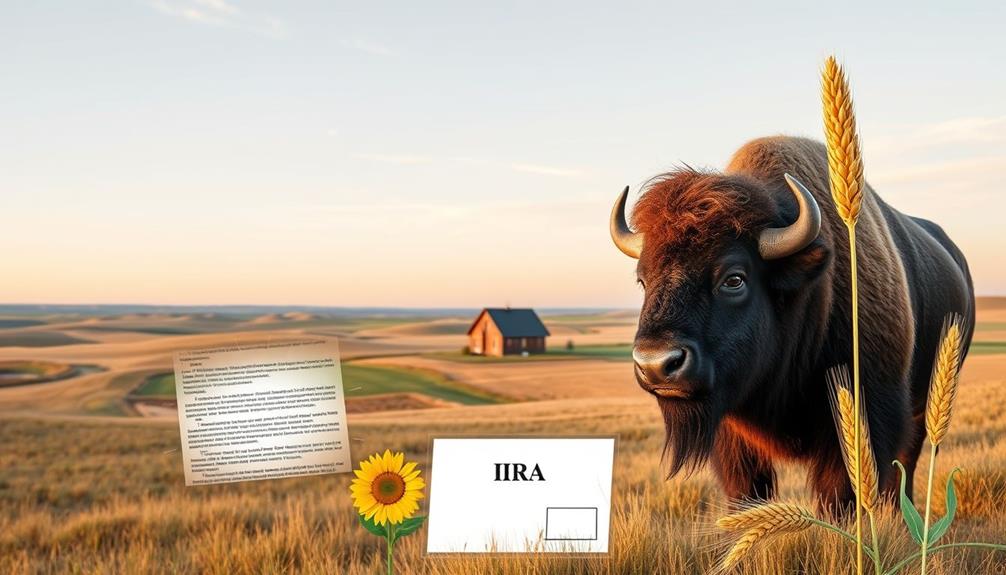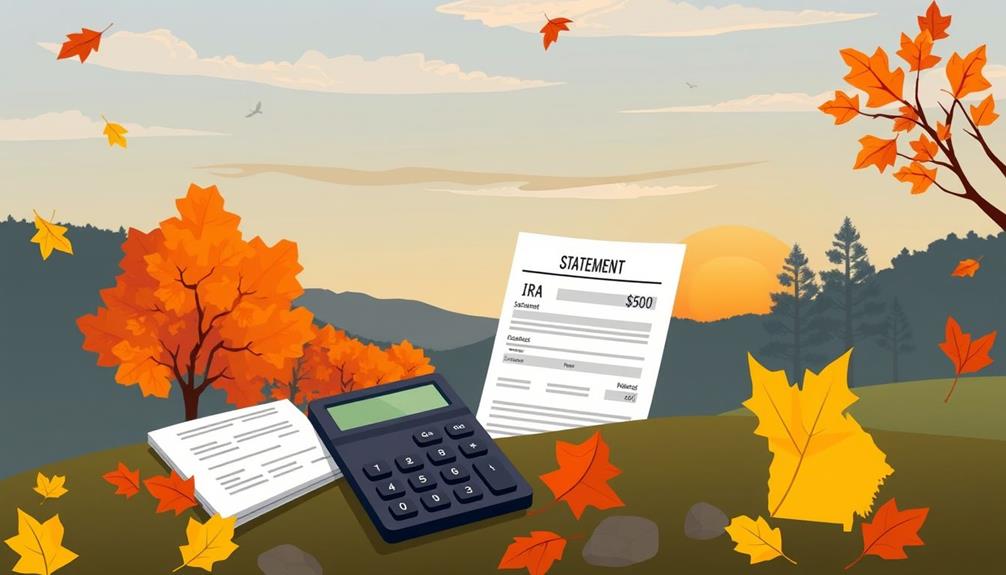When preparing for your retirement in Nebraska, it is crucial to incorporate IRAs alongside state-specific benefits to establish a solid financial base. You have the choice between traditional and Roth IRAs, taking into account tax implications and your future aspirations. Keep in mind that contributions made to IRAs before 1985 may qualify for some tax relief. Combining these accounts with pension benefits and making use of health insurance options can improve your overall financial strategy. Be cautious of penalties associated with early withdrawals; certain exemptions can help you steer clear of them. By comprehending how these components interconnect, you can fine-tune your retirement plan and enhance your financial security. There is a lot more to delve into on this subject.
Key Takeaways
- Understand IRAs' tax implications: Traditional IRAs are taxed upon withdrawal, while Roth IRAs allow tax-free withdrawals under specific conditions.
- Take advantage of state-specific benefits: Nebraska offers tax exemptions on certain pension incomes and contributions made before January 1, 1985.
- Utilize early withdrawal exceptions: Qualified expenses, like first-time home purchases, can help avoid the federal 10% penalty on early IRA withdrawals.
- Integrate IRAs with pension plans: Combining multiple income sources enhances financial stability and provides flexibility in managing taxes and withdrawals.
- Explore health insurance options: Affordable coverage through previous employers can significantly impact overall retirement planning and financial security.
Understanding IRAs in Nebraska

When it comes to retirement planning, understanding Individual Retirement Accounts (IRAs) in Nebraska is fundamental. These accounts offer significant tax advantages that can help you maximize your savings.
In 2024, the contribution limit for IRAs is $7,000, with an extra $1,000 catch-up contribution allowed for individuals aged 50 and older. This means you can effectively boost your retirement nest egg.
In Nebraska, contributions to traditional IRAs aren't taxed, which is a great perk. However, be aware that withdrawals from these accounts are subject to state income tax.
On the other hand, Roth IRAs allow for tax-free withdrawals in retirement, provided you meet specific conditions. This difference in taxation can play a critical role in your retirement strategy.
Understanding how Nebraska's state income tax impacts your IRA withdrawals is important for effective retirement planning. If you properly manage your traditional and Roth IRAs, you can navigate these tax implications wisely.
Always consider your current income and future financial goals when choosing between these options, as the right IRA can provide you with the security you need in your retirement years.
Overview of State-Specific Benefits

While planning for retirement in Nebraska, it's vital to understand the state-specific benefits that can enhance your financial strategy. Nebraska imposes a state income tax on retirement benefits, so you'll want to take into account the implications when saving.
Fortunately, contributions to IRAs made before January 1, 1985, are partially exempt from this tax, providing a potential advantage for your retirement savings.
Here are some key benefits to keep in mind:
- Tax exemptions for certain pension incomes and Thrift Savings Plan distributions can greatly boost your financial planning.
- Group health insurance options through previous employers can help manage healthcare costs effectively.
- Cost of Living Adjustments (COLA), capped at 1.5%, guarantee your purchasing power doesn't diminish over time.
Understanding these benefits is vital for maximizing your retirement income.
By incorporating these state-specific advantages into your IRA and overall financial strategy, you can create a more secure and comfortable retirement in Nebraska.
Don't overlook how these elements can play a significant role in your long-term financial health!
Tax Implications of Retirement Accounts

Understanding the tax implications of retirement accounts in Nebraska is essential for effective retirement planning. Your retirement benefits are taxable from the first payment under the Internal Revenue Code, which means you need to factor this into your retirement finances. Importantly, contributions made before January 1, 1985, are partially excluded from income tax.
When you start receiving benefits, you'll report your income using form 1099R, issued annually. Be aware that federal law requires a 20% withholding for federal income taxes on IRA refunds, and if you take early withdrawals (before age 59½), you face a 10% federal tax penalty. Additionally, Nebraska state income tax applies to your retirement benefits, impacting your overall tax liability.
Here's a quick overview of the tax implications related to retirement accounts:
| Type of Withdrawal | Federal Tax Implications | State Tax Implications |
|---|---|---|
| IRA Refunds | 20% withholding | Taxable |
| Early Withdrawals | 10% penalty | Taxable |
| 401(k) Withdrawals | Taxable as income | Taxable |
| Post-1985 Contributions | Taxable as income | Taxable |
Understanding these factors can help you better navigate your retirement planning.
Integrating IRAS With Pension Plans

Integrating IRAs with pension plans can markedly enhance your retirement strategy in Nebraska. By doing so, you can diversify your retirement savings and optimize both tax benefits and income sources.
With the contribution limit for IRAs set at $7,000 in 2024 (or $8,000 for those aged 50 and over), you have a powerful tool for building your nest egg.
Consider these emotional benefits of integration:
- Peace of mind knowing you have multiple income streams during retirement.
- Financial security from leveraging cost-of-living adjustments (COLA) in state pension plans.
- Flexibility in managing your withdrawal regulations and tax implications.
Since Nebraska's state pension plans often calculate benefits based on years of service and salary history, combining these with your IRA can create a robust retirement income.
Additionally, understanding the withdrawal regulations of both accounts is essential to avoid penalties. By strategically aligning your IRAs with state pension plans, you're not just planning for retirement; you're crafting a financial future that supports your dreams and needs in Nebraska.
Strategies for Mitigating Withdrawal Penalties

Maneuvering the complexities of withdrawal penalties can be essential for your retirement planning in Nebraska. To avoid the 10% federal tax penalty on early withdrawals from an IRA before age 59½, consider utilizing exceptions like qualified education expenses, first-time home purchases (up to $10,000), or certain medical expenses.
Understanding common financial terms related to retirement accounts can also help you make informed decisions. Nebraska offers state-specific benefits that allow penalty-free withdrawals for individuals who become disabled or face significant medical costs.
If you're using a Roth IRA, you can withdraw your contributions anytime without incurring penalties or taxes, provided you don't touch the earnings until you're 59½ or the account has been open for five years.
Another option is a 401(k) loan, which allows you to borrow against your retirement savings without triggering withdrawal penalties, as long as you repay it within the specified timeframe.
Health Insurance Options for Retirees

When planning for retirement in Nebraska, health insurance options play an essential role in guaranteeing your financial security and well-being. As a retiree, you'll have access to various plans, particularly through the Educators Health Alliance. This program provides tailored coverage for educators, managed by the Omaha Public Schools Compensation and Benefits Office, guaranteeing you receive thorough benefits during retirement.
It's vital to contemplate the financial aspects of health insurance as part of your overall retirement planning, as it can greatly influence your financial stability. Here are a few key points to keep in mind:
- Access to affordable health insurance can ease your mind.
- Cost-of-living adjustments (COLA) can help your benefits keep pace with rising expenses.
- Understanding your coverage options guarantees you're prepared for unexpected health needs.
Additionally, the Nebraska Public Employees Retirement Board (NPERS) oversees the shift of health insurance plans to support the financial health of the Omaha Schools Employees Retirement System (OSERS).
Enhancing Financial Stability in Retirement

To enhance your financial stability in retirement, it's vital to strategically combine various retirement plans available in Nebraska. Start by leveraging state-sponsored retirement plans, like the Nebraska Public Employees Retirement System (NPERS), alongside Individual Retirement Accounts (IRAs) to maximize your tax advantages.
Nebraska offers tax exemptions on Social Security benefits and pension income, helping improve your net retirement income.
While the annual contribution limit for IRAs is around $7,000, consider also contributing to employer-sponsored plans like 401(k)s, which allow considerably higher contributions—up to $23,000 in 2024. This gives you greater savings potential.
Don't overlook the importance of Nebraska's cost of living adjustments (COLA) for pension benefits, which help maintain your purchasing power even amid inflation.
Frequently Asked Questions
Can You Combine State and Federal Retirement?
Yes, you can combine state and federal retirement accounts. By integrating both, you diversify your savings strategy and potentially enhance your retirement income, maximizing your financial stability during your retirement years.
What Is the State of Nebraska 457 Plan?
The Nebraska 457 Plan lets you save for retirement with tax-deferred contributions. You can choose from various investments and access your funds without penalties upon leaving your job, offering flexibility in your retirement planning.
Does the State of Nebraska Have a Pension Plan?
Like a sturdy oak, Nebraska does have a pension plan. It's part of the Nebraska Public Employees Retirement System, providing benefits based on your years of service and average salary once you retire after vesting.
What Are the Defined Benefit Plans in Nebraska?
In Nebraska, defined benefit plans, like NPERS, guarantee retirement benefits based on your service years and final salary. You'll need five years of service to vest and can choose various payment options upon retirement.
Conclusion
As you navigate the waters of retirement planning in Nebraska, think of your IRA as a sturdy vessel. By integrating it with state-specific benefits, you're ensuring a smoother journey toward financial stability. Just like a skilled captain, you can chart your course through tax implications and withdrawal penalties, leading to a safe harbor in retirement. Embrace the strategies you've learned, and you'll find that your retirement can be both fulfilling and secure, much like a well-tended garden in full bloom.










